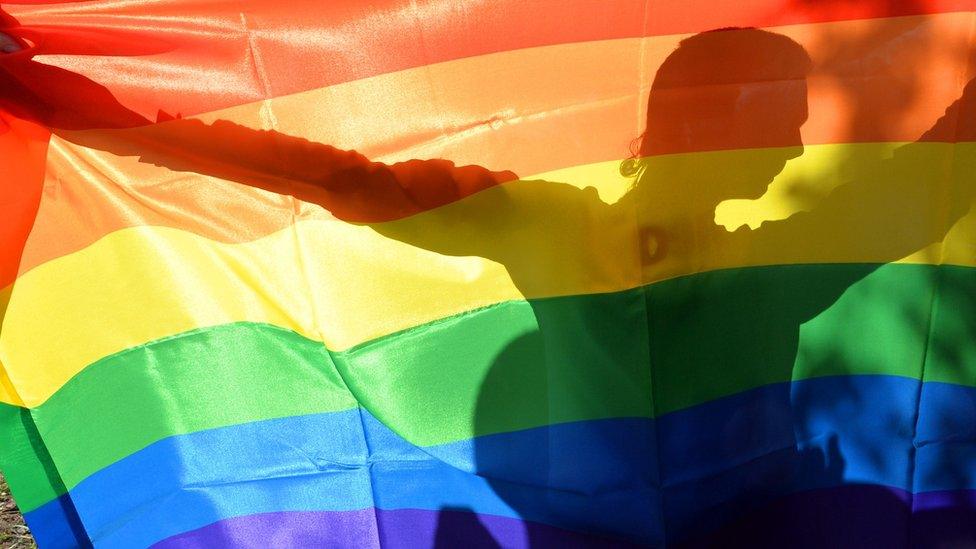Canadian-Ukrainian relations: As thick as blood?
- Published
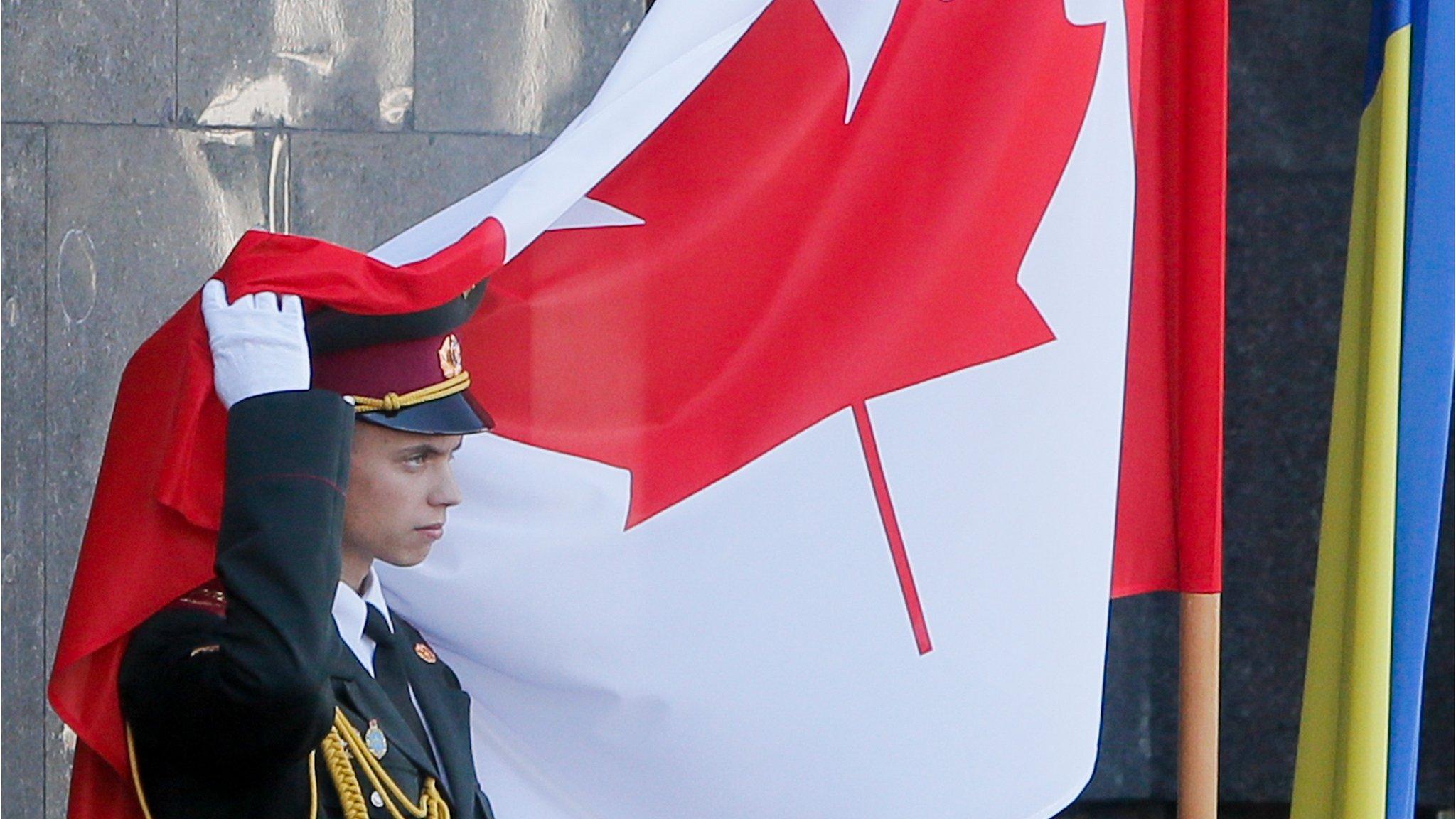
Canada and Ukraine - a very special connection?
Canada's Prime Minister Justin Trudeau has arrived in Kiev where he will sign a free trade deal with the Ukrainian President Petro Poroshenko. Mr Trudeau has just committed troops to a Nato mission in Latvia, in response to Russia's actions in Ukraine - Canada is seen as both a pivotal and personal ally for Ukraine.
Canadians have sent money to the families of dead Ukrainian soldiers, like 42-year-old Andriy Borodyanyk, who was a biology teacher and a single parent before he was killed by a mortar, fired by Russian-backed separatists, in August 2015.
When the war broke out in the east of Ukraine in the spring of 2014, Canadian NGOs rallied to provide winter boots and uniforms for a skeletal Ukrainian military, which had suffered years of post-Soviet neglect.
Since then the Friends of Ukraine Defence Forces Fund, a Toronto-based NGO, has raised two million Canadian dollars ($1.5m; £1.2m). More recently the money has been used to buy body armour, vehicles, water purification systems and medical kits for Ukrainian soldiers.
But perhaps the most vivid example of Canadian help can be seen through the Ukrainian men who have been irreparably scarred, both physically and mentally, by the conflict.
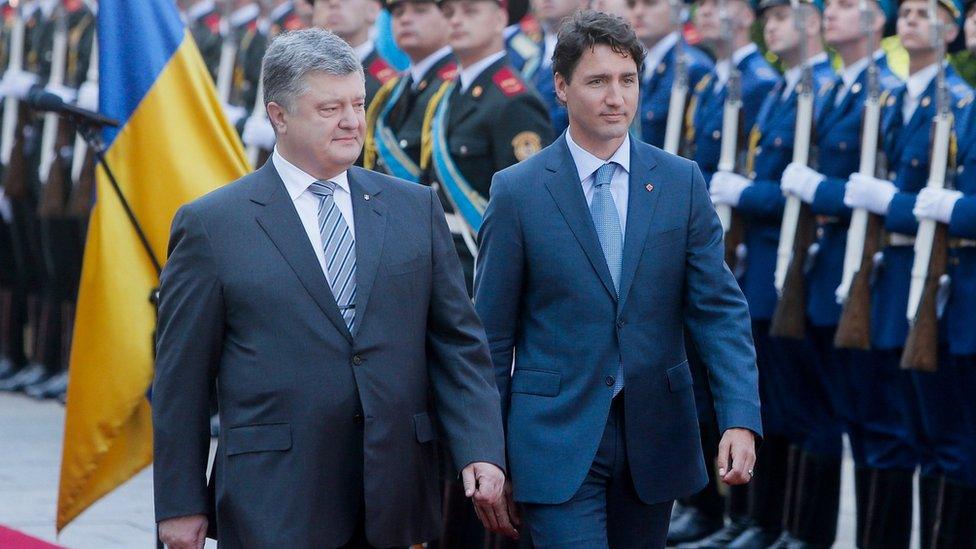
Ukraine's President Poroshenko welcomed Mr Trudeau to Kiev on Monday
In the face of a non-existent rehabilitation system in Ukraine, the League of Ukrainian-Canadian Women set up a project called Guardian Angels Ukraine.
Ukrainian doctors were sent to Canada to visit rehabilitation clinics. Canadian physiotherapists and occupational therapists travelled to Ukraine to train colleagues there.
A striking symbol of Canadian support for a Ukraine at war is a new rehabilitation centre, complete with a gym and a specialist psychological unit on the edge of Kiev.
The impressive influx of money, morale and expertise from a country 7,000km away is explained by the fact that Ukrainian-Canadian relations are as thick as blood.
EU extends Russia sanctions over Crimea annexation
Putin shows who is boss in Crimea
Life on street dividing Ukraine and Russia
The first Ukrainians moved to Canada in the 1890s. Another wave of migrants made the journey at the end of World War Two.
Today there are an estimated 1.3 million Canadians of Ukrainian descent.
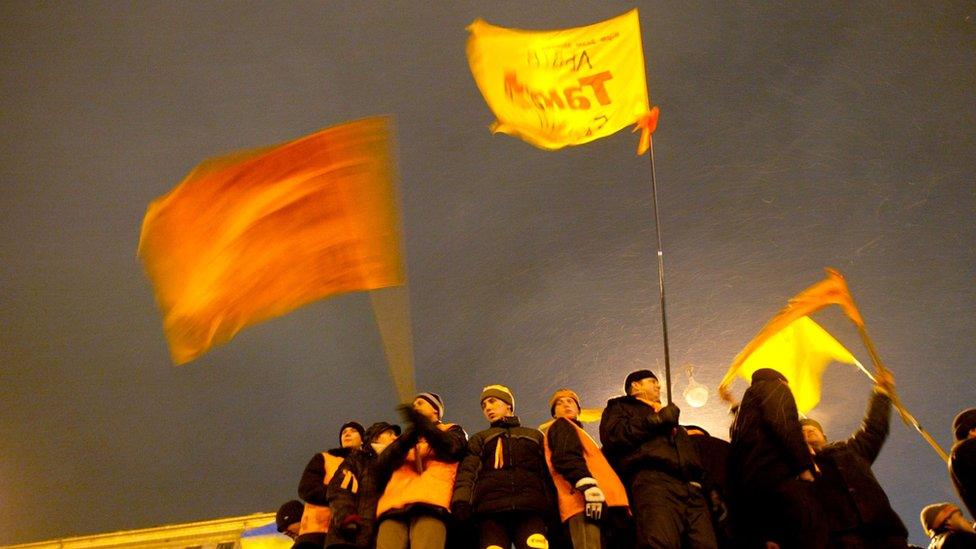
The euphoria of Ukraine's Orange Revolution protesters in 2004 gave way to disappointment as its leaders squabbled once in power
Canadian-Ukrainian organisations like the International Council in Support of Ukraine also work to lobby and educate Canadian members of parliament on the actions of Russia in the region. According to the NGO's director, Anton Sestritsyn, who was born in Crimea, "there are more Ukrainian events in Toronto than there are days."
By visiting Kiev, Canada's 44-year-old charismatic Liberal Prime Minister, Justin Trudeau, is following a well-trodden path. His predecessor, the former Conservative leader Stephen Harper, came to Ukraine three times. In March 2014 Mr Harper was the first G7 leader to visit after Russia's annexation of Crimea.
However the timing and substance of Mr Trudeau's trip makes it particularly poignant. He travels to Kiev straight from the Nato summit in Warsaw, where he committed his country to stationing 450 troops in Latvia as part of Nato's response to what the alliance calls "Russian aggression" in Ukraine.
Mr Trudeau and the Ukrainian President Petro Poroshenko will sign a free trade agreement between the two nations. The deal aims to cut 98% of tariffs over the next seven years.
Western nations know that the success of Ukraine's pro-European post-2014 political order will, to a certain extent, depend on the economy.
And the Canadian leader aims to project a message that Ukraine is open for business and investment, and counteract uncertainty generated by the war with pro-Russian separatists. The fighting is limited to the very easterly part of Ukraine but it drags on with a stubborn persistence.
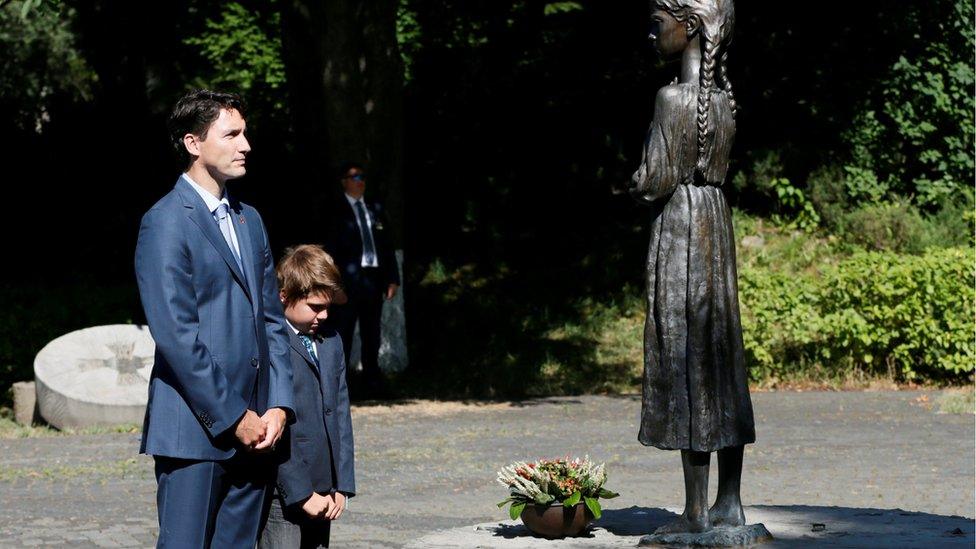
Justin Trudeau and his son visited a memorial to the victims to the Ukrainian famine or Holodomor
Some of the world's media have swooned over Justin Trudeau because of his informal style of politics, but his trip to Kiev looks like it will be shrouded in sombre symbolism.
He will pay tribute to the so-called 'Heavenly Hundred', those Ukrainians killed during the protests in 2013-14, which forced the then pro-Russian President Viktor Yanukovych to leave the country.
One of the first stops on the Canadian leader's itinerary was the memorial in Kiev to the millions of Ukrainians who died of starvation in the 1930s, which in Ukraine is roundly blamed on Soviet agricultural and industrial policies at the time.
Both events are etched into the modern Ukrainian psyche as examples of how Ukrainians have suffered when Moscow has been in charge. They are part of the narrative given out by those who believe passionately in a fully independent, sovereign Ukraine.
Mr Trudeau will also visit a ravine in Kiev known as Babi Yar, where tens of thousands of Jews were murdered by the Nazis and local collaborators during World War Two.
Some of the Russian media have claimed that fascism and the far right is a powerful force in Ukraine today. By visiting the area Canada's leader will be doing his bit to counter such propaganda.
Washington has stopped short of arming Ukraine in its fight against Russian-backed rebels in the east, but it has provided training, money and non-lethal military equipment. A President Clinton would probably offer little change to the US's Ukraine policy - although Ukrainians fear what a Trump presidency would mean.
The European Union is heavily involved, on a more administrative level, in reforming Ukraine's bureaucracy and governance.
Britain has provided military trainers and non-lethal military kit, too. And France's Francois Hollande and Germany's Angela Merkel have played a central diplomatic role in Ukraine's negotiations with Russia.
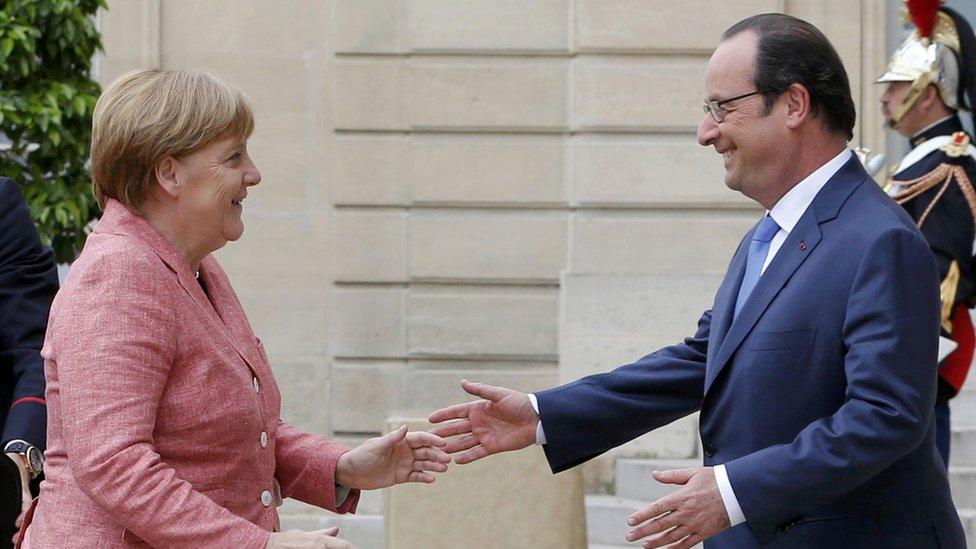
President Hollande and Chancellor Merkel have been central to Ukraine and Russian talks
But there are cracks in the European Union's support for Russian sanctions, linked to the conflict in the east of Ukraine. There is political momentum in countries like France, Italy and Hungary for more engagement with Moscow.
And a presidential source in Kiev told me recently that the expectation is that EU sanctions against Russia will be reduced when they come up for renewal at the end of this year.
In this context, do not underestimate the importance of Ukraine's very personal relationship with Canada. Canada's government has matched, if not surpassed, its Nato allies in terms of financial and practical support for Kiev and its military.
However, at the beginning of the year, the man Mr Trudeau appointed as his Foreign Minister, Stephane Dion, caused alarm for some in the Ukrainian-Canadian community when he said that Canada should resume dialogue with Moscow. Since then Ottawa's rhetoric and actions via Nato have calmed any fears.
"We cannot stop Canada from talking to Russia," said Ukraine's ambassador to Canada, Andriy Shevchenko, who argues that the Trudeau trip to Kiev is about strengthening a "very special connection".
And he added: "My personal mission is that he (Justin Trudeau) falls in love with Ukraine. We want him to see that the energy of the revolution has not disappeared."
- Published27 January
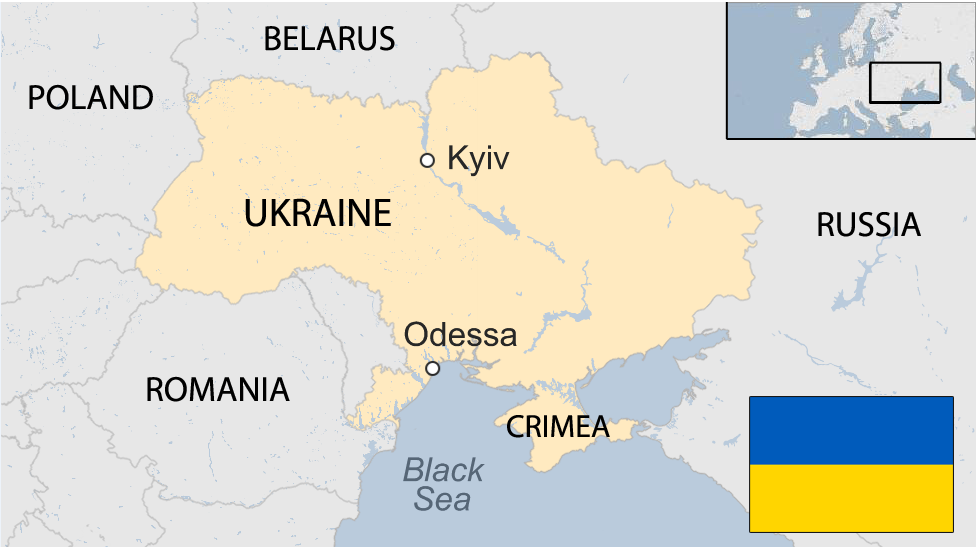
- Published17 June 2016
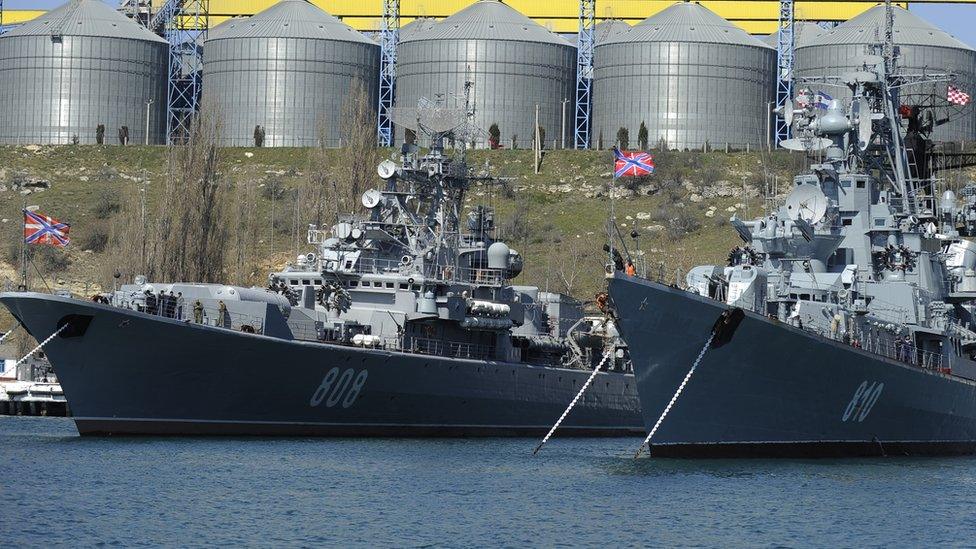
- Published12 June 2016
